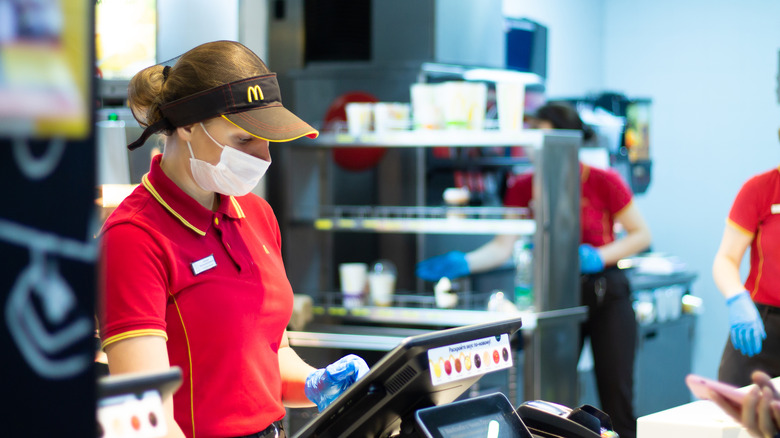Why California Fast Food Workers Might Soon Get Bigger Paychecks
A new piece of legislation passed by the California State Legislature this week could revolutionize the state's fast food industry forever. The Fast Food Accountability and Standards Recovery Act (Fast Act), was approved by Golden State lawmakers despite major lobbying efforts against the bill by fast food juggernauts like Burger King, Chick-fil-A, In-N-Out, and Chipotle, according to QSR Magazine.
The polarizing AB 257 bill, which faced scrutiny from a number of powerful industry leaders, aims at standardizing wages and working conditions for fast food workers across the state. The focal point of the legislation is the formation of a 10-member Fast Food Council — consisting of two fast food franchisees, franchisors, employees, workers rights advocates, and state officials — which will have the power to enact a variety of policies, including regulating working conditions, hours, and wages statewide. Only chains with at least 100 restaurant locations nationwide would be subject to the council's rulings, per The New York Times.
Notably, the newly formed council would have the power to raise the minimum wages for fast food workers to $22 per hour next year. That would mark a huge jump from the current $15 minimum wage that's currently in place, which is already slated to increase to $15.50 in early 2023 (via Los Angeles Times). In addition to instantly increasing wages for workers, the panel will also have the power to increase wages by up to 3.5% each year moving forward.
Workers rights advocates celebrated the passing of the landmark bill
Workers rights advocates celebrated the passing of the bill, which grants fast food workers a major spot at the industry's bargaining table. "Today's win in the Senate shows what's possible when working people unite and raise our voices," said Anneisha Williams, a representative of the Fight for $15 campaign, a grassroots movement aimed at advocating for increased wages for workers in a variety of industries (via QSR Magazine).
Williams, who is a part-time worker at an L.A. Jack In The Box location, became involved in the movement after filing a labor complaint against the company earlier this year over withheld COVID quarantine wages. "We shouldn't have to struggle so much," Williams told the Los Angeles Times. "We want to be treated like we're actually human beings."
Despite widespread support from workers and advocacy groups, the controversial act also faced major scrutiny by fast food industry leaders and labor unions, including the California Restaurant Association, the California Chamber of Commerce, and the International Franchise Association, which co-sponsored a campaign against the legislation. According to The Wall Street Journal, since 2021, labor unions have spent over $5 million lobbying against the landmark bill.
The fate of the bill lies in the hands of Governor Gavin Newsom
Opponents of the Fast Act note that increasing minimum wages for fast food workers to $22 an hour would likely lead to a 20% increase in fast food prices statewide, according to figures compiled by researchers at the UC Riverside School of Business, per Los Angeles Times. Others warn that this increase will lead to restaurants slashing their work forces or shutting down altogether due to increased operational costs.
Now, the Fast Act, which was passed with a 21 to 12 favorable vote by the California State Assembly, will head to the desk of Governor Gavin Newsom, who has the ultimate say in whether the bill gets signed into law, according to The New York Times.
"Fast food workers like me have done whatever it takes to elevate our demand for AB 257 — we've gone on strike, marched in the streets and rallied across the state. We've shown the world we can take on the most powerful corporations and win," Williams said in a statement (via QSR Magazine). "We look forward to Governor Newsom signing AB 257 into law and empowering us to create safe and healthy workplaces across the fast-food industry."


